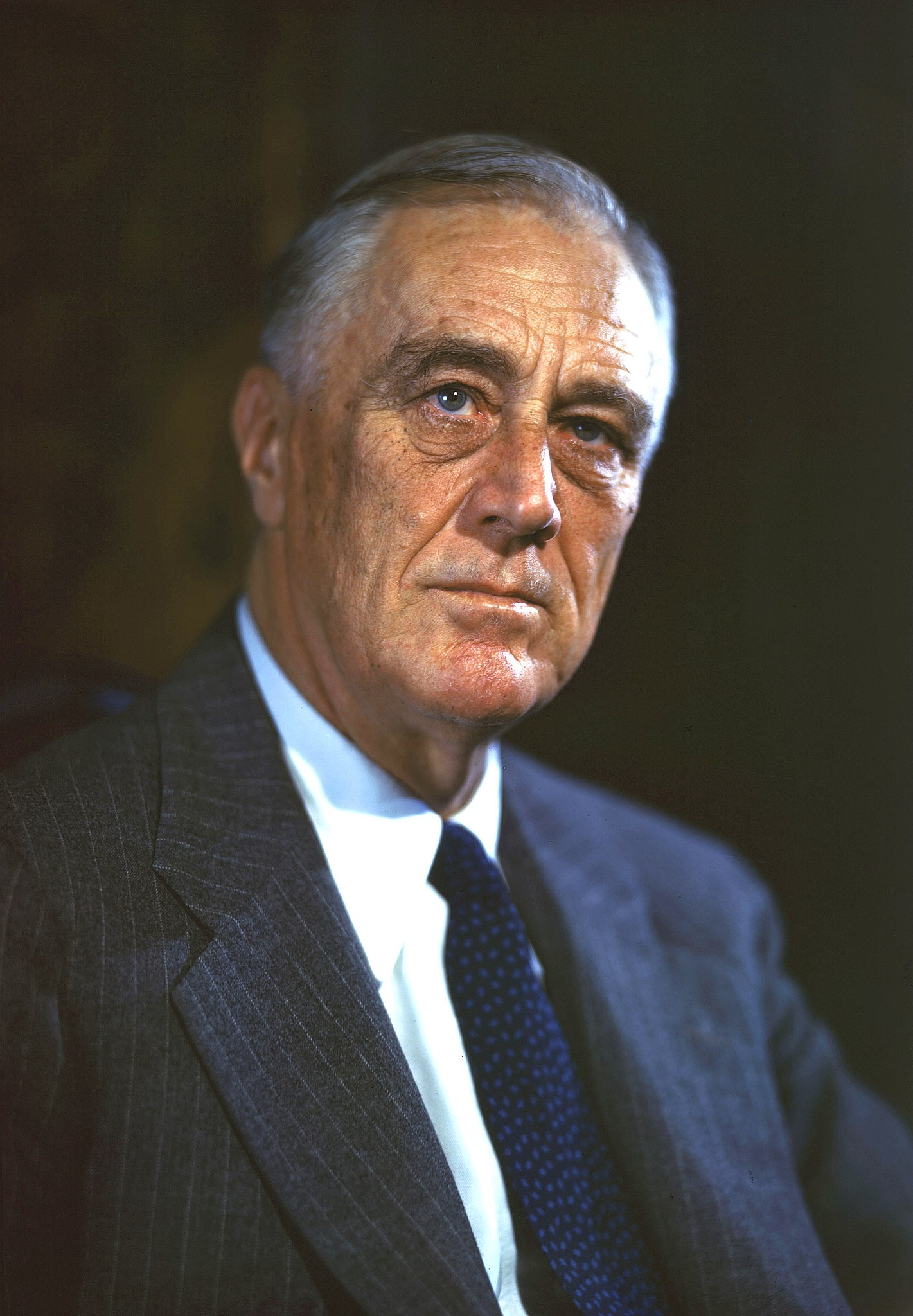(Militarism) Tag: Visual edit |
(Added details about Roosevelt's opinion on Germans after WW2) Tag: Visual edit |
||
| Line 8: | Line 8: | ||
== Presidency == | == Presidency == | ||
In 1940, Roosevelt made an agreement with [[Winston Churchill]] to give the [[United Kingdom of Great Britain and Northern Ireland|UK]] 50 destroyers from the [[First World War]] in exchange for 99-year leases for U.S. military bases in eight British [[Colonialism|colonies]]: [[Antigua and Barbuda|Antigua]], the [[Commonwealth of The Bahamas|Bahamas]], [[Bermuda]], [[Jamaica]], [[Newfoundland]], [[Saint Lucia]], [[Republic of Trinidad and Tobago|Trinidad]], and [[Co-operative Republic of Guyana|Guyana]]. He compared this action to [[Thomas Jefferson]]'s [[Louisiana Purchase]]. It was the first U.S. expansion into British territory since the [[War of 1812]].<ref name=":0222">{{Citation|author=David Vine|year=2020|title=The United States of War|chapter=Reopening the Frontier|page=|city=Oakland|publisher=University of California Press|isbn=9780520972070|lg=http://library.lol/main/191568BFAC73F009132DB00ECD0F0F05}}</ref><sup>:222–8</sup> Presidential candidate [[Wendell Wilkie]] criticized him for taking this action without approval from [[United States Congress|Congress]].<ref name=":0222" /><sup>:235</sup> | In 1940, Roosevelt made an agreement with [[Winston Churchill]] to give the [[United Kingdom of Great Britain and Northern Ireland|UK]] 50 destroyers from the [[First World War]] in exchange for 99-year leases for U.S. military bases in eight British [[Colonialism|colonies]]: [[Antigua and Barbuda|Antigua]], the [[Commonwealth of The Bahamas|Bahamas]], [[Bermuda]], [[Jamaica]], [[Newfoundland]], [[Saint Lucia]], [[Republic of Trinidad and Tobago|Trinidad]], and [[Co-operative Republic of Guyana|Guyana]]. He compared this action to [[Thomas Jefferson]]'s [[Louisiana Purchase]]. It was the first U.S. expansion into British territory since the [[War of 1812]].<ref name=":0222">{{Citation|author=David Vine|year=2020|title=The United States of War|chapter=Reopening the Frontier|page=|city=Oakland|publisher=University of California Press|isbn=9780520972070|lg=http://library.lol/main/191568BFAC73F009132DB00ECD0F0F05}}</ref><sup>:222–8</sup> Presidential candidate [[Wendell Wilkie]] criticized him for taking this action without approval from [[United States Congress|Congress]].<ref name=":0222" /><sup>:235</sup> | ||
Towards the end of the [[Second World War]], Roosevelt stated that he's "more thirsty than ever for German blood," and suggested the idea of castrating Germans.<ref>{{Citation|author=Domenico Losurdo, David Ferreira|year=2020|title=Stalin: The History and Critique of a Black Legend|chapter=How to Cast a God into Hell: The Khrushchev Report|section=Lacking “Common Sense” and “The Mass Deportations of Entire Populations”|page=29|quote=While toward the end of the war F.D. Roosevelt insists he’s “more thirsty than ever for German blood” because of the atrocities they committed, and even entertains the idea, for some time, of “castrating” such a perverse people, Stalin’s position is quite different;|lg=http://library.lol/main/fab891d8f6bbf7bb49e78240483751e4|trans-lang=Italian}}</ref> | |||
== References == | == References == | ||
[[Category:Presidents of the United States]] | [[Category:Presidents of the United States]] | ||
[[Category:Social democrats]] | [[Category:Social democrats]] | ||
Latest revision as of 08:10, 1 November 2023
Franklin D. Roosevelt | |
|---|---|
 | |
| Born | January 30, 1882 Hyde Park, New York, United States |
| Died | April 12, 1945 Warm Springs, Georgia, United States |
| Political orientation | Social democracy |
| Political party | Democratic |
Franklin Delano Roosevelt (January 30, 1882 – April 12, 1945), commonly known as FDR, was a Statesian politician who served as President of the United States from 1933 to 1945. He viewed the outside world as a threat and encouraged militarism that continued into the Cold War after his death.[1]
Family
Roosevelt's grandfather, Warren Delano, became rich from the opium trade in China.[2]
Presidency
In 1940, Roosevelt made an agreement with Winston Churchill to give the UK 50 destroyers from the First World War in exchange for 99-year leases for U.S. military bases in eight British colonies: Antigua, the Bahamas, Bermuda, Jamaica, Newfoundland, Saint Lucia, Trinidad, and Guyana. He compared this action to Thomas Jefferson's Louisiana Purchase. It was the first U.S. expansion into British territory since the War of 1812.[3]:222–8 Presidential candidate Wendell Wilkie criticized him for taking this action without approval from Congress.[3]:235
Towards the end of the Second World War, Roosevelt stated that he's "more thirsty than ever for German blood," and suggested the idea of castrating Germans.[4]
References
- ↑ David Vine (2020). The United States of War: 'The Spoils of War' (p. 280). Oakland: University of California Press. ISBN 9780520972070 [LG]
- ↑ David Vine (2020). The United States of War: 'The Military Opens Doors' (p. 206). Oakland: University of California Press. ISBN 9780520972070 [LG]
- ↑ 3.0 3.1 David Vine (2020). The United States of War: 'Reopening the Frontier'. Oakland: University of California Press. ISBN 9780520972070 [LG]
- ↑ “While toward the end of the war F.D. Roosevelt insists he’s “more thirsty than ever for German blood” because of the atrocities they committed, and even entertains the idea, for some time, of “castrating” such a perverse people, Stalin’s position is quite different;”
Domenico Losurdo, David Ferreira (2020). Stalin: The History and Critique of a Black Legend: 'How to Cast a God into Hell: The Khrushchev Report; Lacking “Common Sense” and “The Mass Deportations of Entire Populations”' (p. 29). [LG]